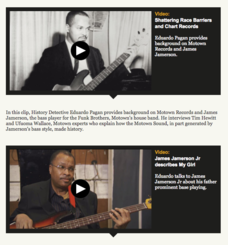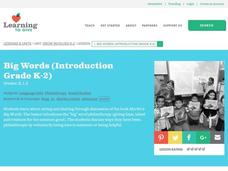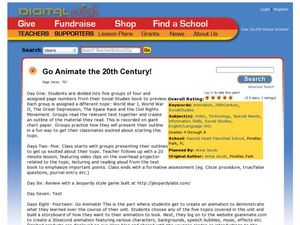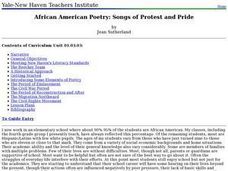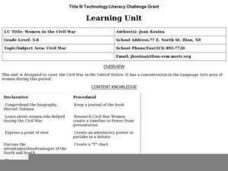National Endowment for the Humanities
Revolution '67, Lesson 2: What Happened in July 1967? How Do We Know?
Even in a world in which dozens of participants and curious onlookers record every controversial event, the basic facts of what happened are often in dispute. Revolution '67, Lesson 2 explores 1967 Newark, New Jersey using an examination...
PBS
The Sixties: Hitsville USA
James Jamerson. You probably heard him but may not have heard of him. But fans of Motown Records will certainly recognize his contributions to the sound that desegregated popular music during the 1960s. Challenge young history detectives...
Center for History and New Media
The Impact of the Jim Crow Era on Education, 1877–1930s
Even though American slaves were officially emancipated in 1865, the effects of slavery perpetuated throughout the 19th and 20th centuries. Middle and high schoolers learn about the ways that discrimination and the Jim Crow laws...
Curated OER
From Jim Crow To Linda Brown: A Retrospective of the African-American Experience from 1897 to 1953
Learners examine African American issue between the years 1897 and 1953. In this African American history lesson, students research the social, economic, and political conditions of African Americans during the aforementioned time span...
Curated OER
Just-Us and Kindness: A Voice for Children: King Day
Eighth graders investigate philanthropy. In this service learning lesson, 8th graders read human rights literature and use information gleaned to discuss children's rights around the world. Students discuss scenarios meant to prompt...
Curated OER
Equality: Are Some More Equal than Others?
Students research a person who has been active in supporting human rights around the world. They simulate an international conference and write a newsletter focused on human rights in a specific country.
Curated OER
Big Words
Students discover philanthropy. In this philanthropic lesson, students read Martin's Big Words and explore voluntarily being nice to people. Students discover how they may perform acts of service for others. Extension activities are...
Curated OER
The Power of Protest
High schoolers explain how Rosa Parks refused to give up her bus seat to a white man. They discuss how her actions were heroic and how they affected the civil rights movement. They reflect on the lesson in journal entries.
Curated OER
Apartheid and Segregation
Students view a television program that depicts the history South African Apartheid and the United States' system of segregation. They discuss how laws were used to uphold these institutions and compare and contrast racism and...
Curated OER
Inventors & Trailblazers
Students are introduced to a groups of African American inventors. In groups, they research the role of each person in improving different industries. They also examine the barriers African Americans faced from the Civil War to the...
Curated OER
Say It Loud!: A Celebration Of Black Music In America
Students examine the role music played in African American history and research events of the Civil Rights movement.
Curated OER
Go Animate the 20th Century!
Students create animations to match their social studies. in this 20th century lesson plan, students work in groups to read and present to their classmates World War I, World War II, The Great Depression, The Space Race, or the Civil...
Curated OER
You and the Law -- Beating the Odds
Students examine the rate of institutional racism in the United States. Individually, they write in their journals about how they can make better choices and increase their self-esteem. Using historical documents, they identify the...
Curated OER
African American Poetry: Songs of Protest and Pride
Students are introduced to various time periods in history in which African Americans wrote songs and poetry to cope. In groups, they travel between different stations to listen or read poems and music from the Civil War period, Civil...
Curated OER
Women in the Civil War
Students study the Civil War era in the US with a concentration on women during this time through literature and biographies. They create a timeline or multimedia presentation as one product of this series of lessons.
Curated OER
I Have a Dream...
Students explore the dream of Martin Luther King, Jr. In this civil rights lesson, students utilize their computer skill as they compose "I have a dream" statements.
Anti-Defamation League
Harriet Tubman on the $20 Bill: The Power of Symbols
How important are symbols and symbolic gestures in society? Middle schoolers have an opportunity to analyze the importance of symbols on American currency with a lesson plan that investigates the controversies surrounding redesigning the...
Center for History and New Media
Growing Up in a Segregated Society, 1880s–1930s
What did segregation look like in the beginning of the 20th century? Middle and high schoolers view images of segregated areas, read passages by Booker T. Washington and W.E.B. DuBois, and come to conclusions about how the influence of...
Curated OER
Change: Just a Matter of Time
Students analyze the Declaration of Independence and primary sources to explain civil rights. Then, students write a Declaration of Change to express the grievances of African Americans, and their desire to participate fully in the...
Curated OER
Court Documents Related to Martin Luther King, Jr., and Memphis Sanitation Workers
Young scholars read about the civil rights movement in their textbooks. They engage in a whole-class discussion of how nonviolent direct action can be a powerful tool for bringing about social, economic, or political change.
Curated OER
Brother Outsider
Students view the film "Brother Outsider" and read an article by Bayard Rustin as springboards to discuss the concept of civil rights in the United States. They follow a discussion guide.
Curated OER
Breaking Barriers
Students investigate racism in the 20th century by exploring U.S. History. In this Civil Rights lesson, students review the history of slavery, the Civil War and the fight for equality in the mid 1900's. Students complete Civil Rights...
Curated OER
Rosa Parks
Students examine the actions of Rosa Parks. They identify the reasons why philanthropy is good for the community and individuals. They write a letter to someone they admire because of their qualities.
Curated OER
A House Divided: Slavery in the United States
Students explore the history of the United States and slavery. In this slavery lesson plan, students view primary sources, complete journal writing, view videos, and answer short answer questions.



